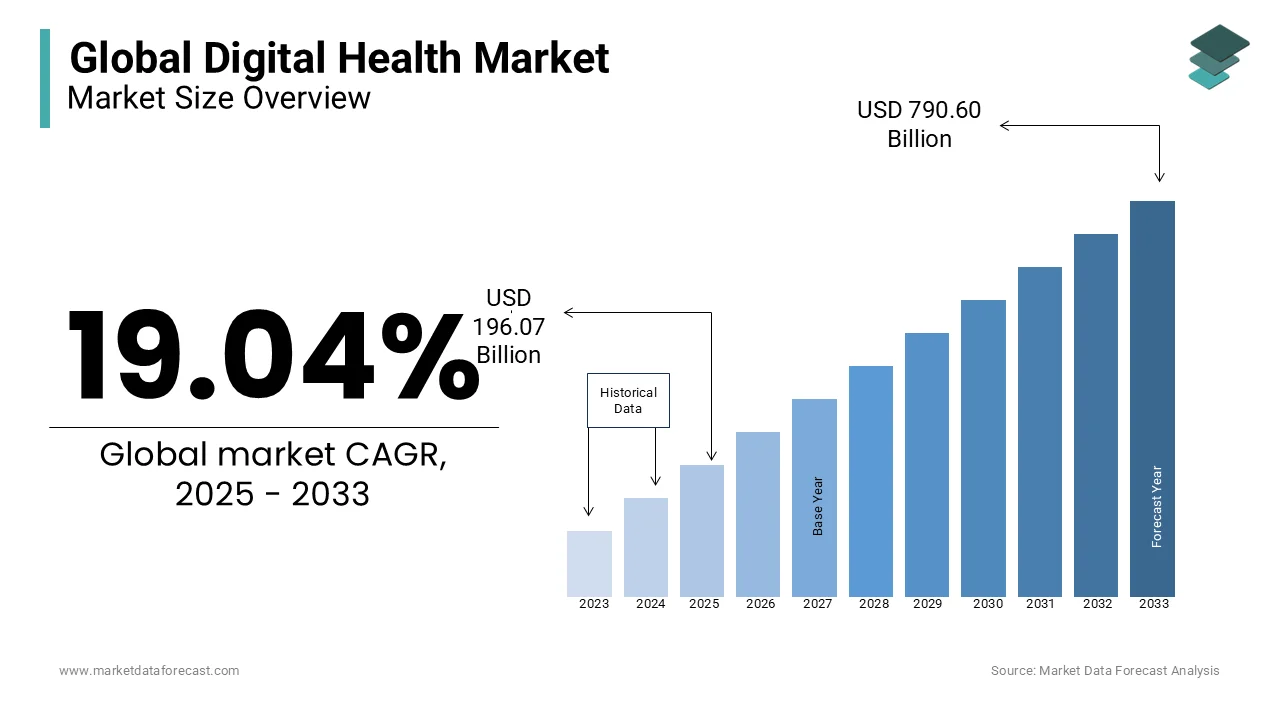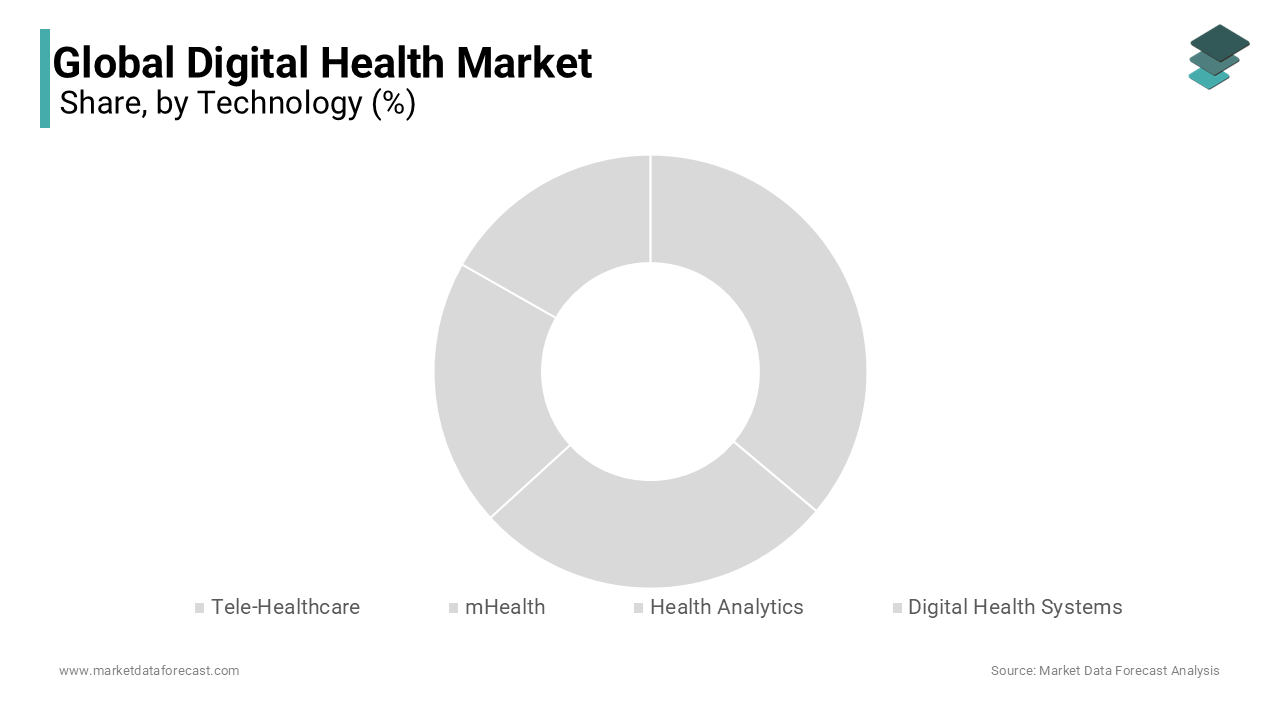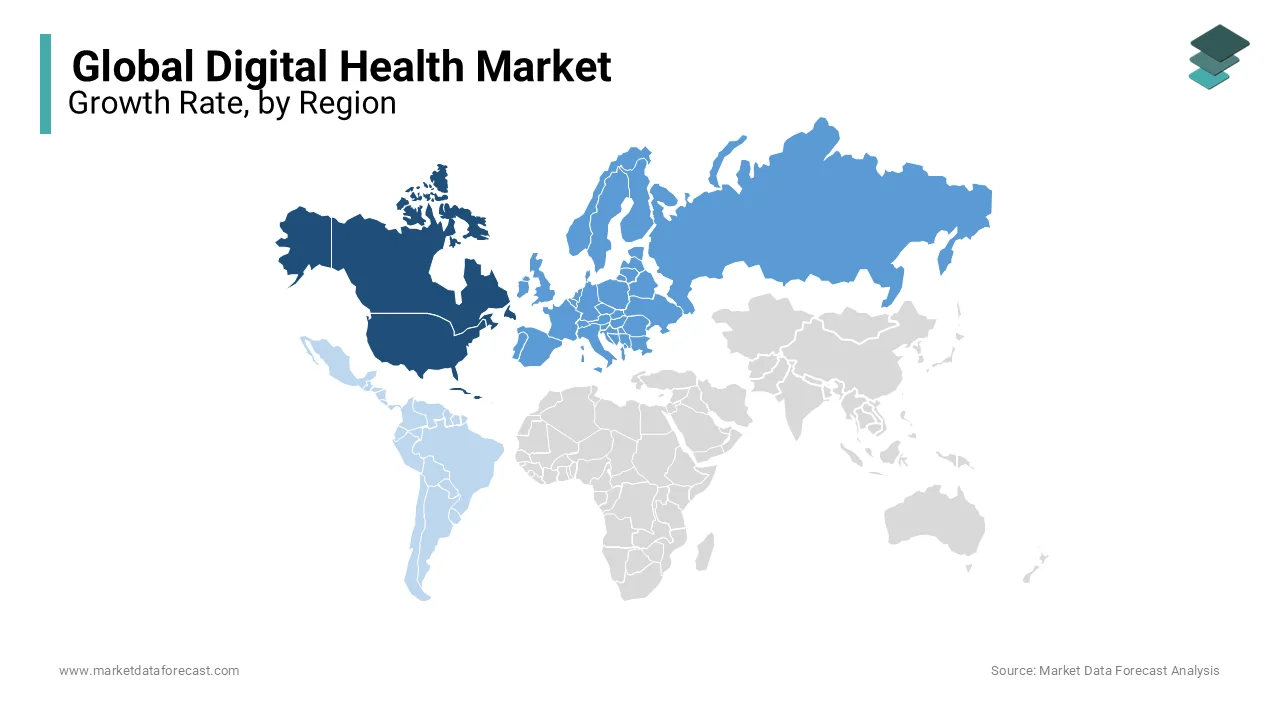Global Digital Health Market Size, Share, Trends & Growth Forecast Report By Technology (Tele-Healthcare, Mobile Health, Health Analytics and Digital Healthcare Systems), Component (Hardware, Software and Services) and Region (North America, Europe, Asia-Pacific, Latin America, Middle East and Africa), Industry Analysis From 2025 To 2033.
Global Digital Health Market Size
The size of the global digital health market was worth USD 164.71 billion in 2024. The global market is anticipated to grow at a CAGR of 19.04% from 2025 to 2033 and be worth USD 790.60 billion by 2033 from USD 196.07 billion in 2025.

Digital Health combines Information technology, communications, and the healthcare system. Digital Health incorporates software, hardware, and services for the healthcare industry. Digital Health includes mobile applications with healthcare (mHealth), electronic health records (EHRs) and electronic medical records (EMRs), telehealth, and Telemedicine along with wearable devices. Digital Health is playing a crucial role in the expansion of the advancements in the healthcare industry. The digital health stakeholders include patients, health professionals, researchers, application developers, distributors, and medical device manufacturers. The global digital health market accounted for the most considerable market growth and is projected to grow significantly during the forecast period. DigitalDigital Health includes healthcare informatics, health analytics, hospital IT, medical technology, information technology, and healthcare tools. The IT and communications in digital health help prevent diseases and enhance quality of life.
MARKET DRIVERS
The rise in the usage of smartphones and the internet, rising standards of healthcare IT infrastructure across the world, and growing focus on fitness are majorly driving the global digital health market growth. According to various sources, approximately 69% of the world population or 6.9 billion people owned a smartphone by 2023. Technological advancements in the Healthcare industry are primarily hiking the growth rate of the global digital health market. The rising elderly population and awareness of the benefits of digital health systems are further propelling the growth of the digital health market tremendously. Patients with chronic diseases need healthcare services continuously, which can be provided by digital healthcare very quickly. Digital Health can help to compensate for the shortage of healthcare professionals worldwide. According to the WHO, the deficit of healthcare professionals could rise to 9.9 million by 2030.
The government and regulatory bodies worldwide are funding the development of digital health services, which is estimated to favor market growth.
The growing usage of virtual reality devices in pain management and the increasing adoption of artificial intelligence and machine learning in healthcare also contribute to the demand for digital health services and contribute to the global market growth. Big data in healthcare stores patient information and analyses the data, lowering medication errors next time.
An increase in smartphones and smart devices has led to the introduction of apps that can help us monitor our body vitals, like blood pressure and heart rate and the number of calories burned during the day. Other types of apps allow us to do physical exercise and yoga correctly. The easy user interface is the prominent feature of these apps, contributing a lot to the market growth. The recent outbreak of COVID-19 further actively drives the growth of the global digital health market. Increased adoption of remote monitoring has recently been noticed in hospitals worldwide, as most chronic patients need continuous monitoring. They are most likely to get infected by the Coronavirus.
Digital health solutions allow patients to be crucial in managing their Health. Digital health tools such as wearable devices, mobile apps, and online healthcare platforms that provide real-time data along with educational resources are escalating market growth opportunities. The improvement in accuracy and decision-making due to digital health technologies as these provide large amounts of health data that leverages the diagnosis, treatment, and monitoring of patient progress, augmenting the digital health market growth opportunities.
The enlarging of new digital health models, especially in emerging countries, is expected to enhance healthcare delivery, such as accessibility, affordability, quality, and safety, increasing market growth opportunities in the coming years. Digital technology is providing innovations in the healthcare industry by providing higher efficiency and new diagnostic and treatment options. Where these advances are expected to accelerate growth opportunities across developing nations. The growing adoption of technological advancements in the healthcare industry is due to the enlarging benefits of Digital Health, such as saving time and improving accuracy by integrating novel technologies. These enhancements propel digital Health with various opportunities for market expansion. The increased favorable government initiatives in the United States and European region, owing to their advanced healthcare infrastructure and greater investments, will augment the market revenue.
MARKET RESTRAINTS
Products and services of digital Health must comply with regulations and policies, and these regulations and policies vary from country to country, which makes it difficult for the products and services to enter the market. Data privacy and security of people are further hindering the growth of the digital health market. Digital health products and services require access to patients' health data, which has become a notable concern to people who adopt digital health products and services. Lack of interoperability and resistance to change to digital technologies by healthcare providers further impede the digital health market growth. Unfavorable reimbursement for digital health technologies in some countries, lack of digital infrastructure in some countries, and the high cost of some digital health products and services are inhibiting the growth rate of the digital health market. Poor awareness levels among healthcare providers and patients regarding the benefits of digital health solutions and the availability of various digital health apps are other major obstacles to the growth of the digital health market. The complexity associated with integrating digital health solutions into existing healthcare workflows and processes further showcases a negative impact on the digital health market growth.;
The presence of stringent regulations regarding the approval of digital platforms and increasing security concerns as they hold the complete patient information acts as a challenge to the market players in expanding the market growth. The rising potential for data breaches and identity theft reduces trust in digital health technologies and limits market expansion. The utilization of digital health technologies is raising ethical and legal concerns due to issues like data ownership, consent, and liability, which may hinder the market's growth opportunities. The presence of abundant health information available to patients may lead to misinterpretation of data and increase the number of inaccurate sources, which leads to confusion and ineffective decision-making. Various technical challenges due to complete dependency of the digital health on the technology which arises concerns such as network disruptions or software glitches which hinder the availability and reliability of digital health services.
REPORT COVERAGE
|
REPORT METRIC |
DETAILS |
|
Market Size Available |
2023 to 2033 |
|
Base Year |
202 4 |
|
Forecast Period |
2025 to 2033 |
|
Segments Covered |
By Technology, Component, and Region |
|
Various Analyses Covered |
Global, Regional and Country Level Analysis, Segment-Level Analysis, Drivers, Restraints, Opportunities, Challenges; PESTLE Analysis, Porter's Five Forces Analysis, Competitive Landscape, Analyst Overview of Investment Opportunities |
|
Regions Covered |
North America, Europe, APAC, Latin America, Middle East & Africa |
|
Key Market Profiles |
Apple Inc., AirStrip Technologies, Google Inc., Orange, Allscripts Healthcare, LLC, Mckesson Corporation, Athenahealth Inc., At&T Inc., Biotelemetry, Inc., Cerner Corporation, Cisco Systems, Inc., Koninklijke Philips Nv, Eclinicalworks, Ihealth Lab, Inc. and General Electric Company. |
SEGMENTAL ANALYSIS
By Technology Insights

Based on technology, the health analytics segment had the most significant market share in the global market in 2023. The rise in the infection rate is a substantial factor for the segment's growth in the forecast period. These health analytics also help analyze the patient's data so that it can be used again if the patient needs it. In addition, the demand for health analytics is increasing due to COVID-19. Health analytics is also used to track the spread of the Coronavirus through various applications.
The digital health system had the second-largest global market share in 2023. Growing demand for Telemedicine and the rise in in-home care settings are majorly fuelling the growth of this segment. In addition, there is a demand for paperless patient records, such as electronic health records (EHRs).
The tele-healthcare segment is estimated to progress at a promising CAGR during the forecast period. The digital health boom has helped us actively monitor our Health and that of other people so that we can take timely action in an emergency. The vitals then allow the physicians to provide medication to the patients without being physically present with the doctor. In telehealth, there is LTC monitoring and video consultation. The patients are now consulting with their physicians on online video calls rather than being physically present to avoid the virus. As a result, it is expected to grow reasonably and currently has the second-largest market share among other segments.
The mHealth segment is subdivided into wearables and apps. The penetration of wearable devices in the market has boosted the digital health market worldwide. These wearable devices include glucometers, BP monitors, pulse oximeters, Sleep Apnea Monitors (PSG), neurological monitors, and activity trackers. Wearable devices have become popular due to increasing awareness about their Health. Many companies have improved technology to make these devices smaller and have multiple functions. The big tech giants have also introduced their products, making the competition tougher and thus benefiting the customers.
By Component Insights
Based on the Component, the software segment dominated the global digital health market with a market share of 40% in 2023 and is predicted to continue its dominance throughout the forecast period. Rising requirement levels of EHRs, fitness, and mobile apps support this segment's growth. In addition, the continuous development in the IT sector propels the market growth in the segment. As a result, many old tech companies are in this market, and new ones have also entered it, or they can outsource their software developments to other big players.
The hardware segment is estimated to showcase a promising CAGR during the forecast period. Significant tech companies are entering the hardware segment, like wearable devices, to capture the untapped market. New players have also emerged to provide effective and cheap hardware devices.
The services segment is expected to witness a healthy rate during the forecast period due to the growth in hardware and software and constant up-gradation growth. The service segment has many sub-segments: diet-related, consultation-related, Health monitoring-related, and exercises. In addition, the increase in population, along with the health-conscious population, has fuelled the growth of this market.
REGIONAL ANALYSIS

The global digital health market was dominated by North America in 2023. It is majorly attributed to the rapid adoption of smartphones, advancements in coverage networks, a rise in the prevalence of chronic diseases, and an increase in the geriatric population. Artificial intelligence (AI) and the IT industry are well-developed in this region, and they have introduced innovative healthcare solutions. The domination of the North American regional market in the global market is expected to continue during the forecast period. The governments of the North American countries are taking initiatives to promote the digitalization of healthcare. The US FDA is also regulating and promoting digital Health to improve the healthcare facilities provided to patients. There is a rise in smartphone use, especially healthcare apps, which is predicted to propel the market growth in this region.
Europe accounted for an outstanding global market share in 2023 and is expected to grow at a healthy CAGR during the forecast period due to the advancements in modern healthcare services. Government initiatives have also helped the market grow at a faster pace. In addition, the European Commission is working to provide citizens with the benefits of Digital Health. Digital Healthcare Europe is an initiative that promotes innovation in digital Health.
The Asia Pacific market is estimated to grow at a prominent CAGR during the forecast period. The growth is attributed to the high population in countries like India and China. The region is still very new to the technology in terms of reach but can become number one in the long term. There has been a rise in the adoption rate of digital Health in the region. The governments of Asia-Pacific countries are adopting digital Health in the system. Countries like India, China, and Japan have a modern infrastructure for digitalization.
Latin America accounted for a considerable share of the global market in 2023 and is expected to grow at a steady CAGR during the forecast period. Among the countries of Latin America, Brazil, and Mexico are predicted to hold the leading share of the Latin American market in the coming years.
KEY MARKET PLAYERS
A few of the notable companies dominating the global digital health market profiled in this report are Apple Inc., AirStrip Technologies, Google Inc., Orange, Allscripts Healthcare, LLC, Mckesson Corporation, Athenahealth Inc., At&T Inc., Biotelemetry, Inc., Cerner Corporation, Cisco Systems, Inc., Koninklijke Philips Nv, Eclinicalworks, Ihealth Lab, Inc. and General Electric Company.
RECENT HAPPENINGS IN THE MARKET
- In January 2023, AVIA, a leading healthcare digital transformation partner, announced the launch of the AVIA marketplace. This is the most broad and extensive platform for hospitals and health system innovators to research, verify, and choose digital health solutions.
- In July 2023, The Peterson Center on Healthcare launched the Peterson Health Technology Institute (PHTI), which is a non-profit organization. This organization provides various evaluations of innovative healthcare technologies that improve Health with effective cost methods.
- In March 2023, GE Healthcare announced the partnership with Advantus Health Partners for a multi-year contract. This contract is to expand access to Healthcare Technology Management Services.
- In April 2023, Microsoft announced its collaboration with the Epic Systems Corporation to integrate AI into EHR, enabling healthcare professionals to enhance productivity and patient communication with AI-based solutions.
- In March 2023, BlueRock Therapeutics LP collaborated with Emerald Innovations along with Rune Labs. The collaboration aims to focus on innovations for contactless and invisible, wearable digital health technology that monitors Parkinson's disease.
- In March 2023, Nabla Technologies launched Copilot as a Chrome extension, a digital assistant tool that uses GPT-3 to transform patient conversations into action.
- In June 2020, Happify Health and AHA partner collaborated and released the heart health-focused digital mental health program. The partnership between this digital Health and cardiovascular health organization aims to lessen stress and encourage healthy benefits for employees with high blood pressure and high cholesterol.
- In June 2020, Athenahealth launched a new EHR-embedded telehealth tool to enable professionals to conduct virtual visits without downloading separate software or using another third-party app.
- In April 2020, Google Inc. announced the accessibility of technology to make it more comfortable for patients to access their health information through third-party apps. Google Healthcare API will need them to make it more convenient for patients to see and use their digital health data.
- In February 2020, Allscripts Inc. collaborated with Manorama Info Solutions to develop a coupled healthcare management system and health information exchange platform.
MARKET SEGMENTATION
This research report on the global digital health market has been segmented and sub-segmented based on technology, component, and region.
By Technology
- Tele-Healthcare
- Telecare
- Activity Monitoring
- Remote Medication Management
- Telehealth
- LTC Monitoring
- Video Consultation
- Telecare
- mHealth
- Wearables
- BP Monitor
- Glucose Meter
- Pulse Oximeter
- Sleep Apnea Monitors
- Neurological Monitors
- Others
- Apps
- Medical Apps
- Fitness Apps
- Wearables
- Health Analytics
- Digital Health Systems
- Electronic Health Records
- E-Prescribing Systems
By Component
- Hardware
- Software
- Service
By Region
- North America
- Europe
- the Asia Pacific
- Latin America
- The Middle East and Africa
Frequently Asked Questions
How much is the global digital health market going to be worth by 2033?
The global digital health market size is projected to value USD 790.60 billion by 2033.
Which segment by technology is estimated to grow the fastest in the digital health market in the coming years?
Based on technology, the health analytics segment is one of the fastest-growing segments and is predicted to show domination among all the segments from 2025 to 2033.
Which are the companies playing a leading role in the digital health market?
Apple Inc., AirStrip Technologies, Google Inc., Orange, Allscripts Healthcare, LLC, Mckesson Corporation, Athenahealth Inc., At&T Inc., Biotelemetry, Inc., Cerner Corporation, Cisco Systems, Inc., Koninklijke Philips Nv, Eclinicalworks, Ihealth Lab, Inc. and General Electric Company are some of the companies playing a key role in the global digital health market.
Related Reports
Access the study in MULTIPLE FORMATS
Purchase options starting from $ 2500
Didn’t find what you’re looking for?
TALK TO OUR ANALYST TEAM
Need something within your budget?
NO WORRIES! WE GOT YOU COVERED!
Call us on: +1 888 702 9696 (U.S Toll Free)
Write to us: [email protected]
